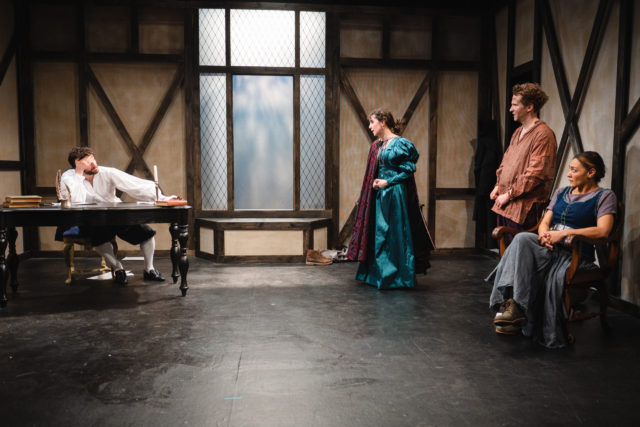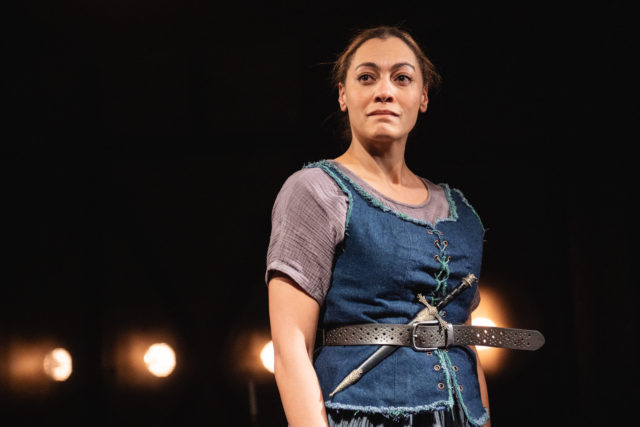
William Shakespeare (Michael Urie) is suffering from writer’s block during the plague in Jane Anger (photo by Valerie Terranova)
JANE ANGER
New Ohio Theatre
154 Christopher St.
Tuesday – Sunday through March 26, $25-$75
newohiotheatre.org
www.janeangerplay.com
Talene Monahon’s Jane Anger is a frenetic farce that believes if you hit the audience with a nonstop, relentless barrage of jokes, enough are going to stick to make the experience worthwhile. The laughs actually begin with the full title, which is: Jane Anger or The Lamentable Comedie of Jane Anger, that Cunning Woman, and also of Willy Shakefpeare and his Peasant Companion, Francis, Yes and Also of Anne Hathaway (also a Woman) Who Tried Very Hard. And I’m happy to say that more than enough jokes hit their target to make this a very funny evening.
It’s 1606, and London is in the midst of yet another plague. Addressing the audience directly at the start of the play, Jane Anger (Amelia Workman) immediately equates that time with recent global affairs. “It’s back, baby!” she announces. “The death carts are out, the plague screecher is running around screeching, the playhouses have closed, fleas are swarming the streets, people are freaking out.”
With the city in lockdown, including the theater, William Shakespeare (Michael Urie) is stuck in his home, suffering an extreme case of writer’s block. With no place to go, Francis Sir (Ryan Spahn), an apprentice actor with the King’s Men — who appears to be much older than the nearly sixteen years he claims to be — asks for shelter from the Bard, who agrees to let him live on the floor in his writing room. The quaint Elizabethan set, by Joey Mendoza, features a large window in the back that functions as an entrance, above where Francis sleeps.
“Sixteen? This seems most improbable to me,” the Bard says. “You seem somewhat older and uglier and more weathered in the face.” Francis replies, “The poverty, sir. It has coarsened me. I assure you I am a mere youth. A boy, a stripling, a youngker!”

Real-life partners Michael Urie and Ryan Spahn star in new play by Talene Monahon (photo by Valerie Terranova)
Feeling a ton of pressure — during the 1593 plague, Shakespeare wrote the poems Venus and Adonis and The Rape of Lucrece and worries that now he will be outpaced by the prolific Ben Jonson and even Thomas Middleton — the Bard ultimately decides to pen King Lear, even though there is already another play about the same monarch, purportedly written by Thomas Kyd, called King Leir. But to make the story his own, Shakespeare is going to change Leir to Lear and Cordella to Cordelia.
Soon the Dark Lady of Shakespeare’s sonnets, Jane, his muse, pays a surprise visit on her former lover. “You’re alive. You came!” the Bard declares. “Aw! Not any time that you would remember,” Jane ribaldly answers.
Jane has a favor to ask of Shakespeare: She needs him to sign a document endorsing a pamphlet she is trying to get published by William Jaggard. (In fact, a woman going by the name Jane Anger did publish a highly influential 1589 pamphlet entitled “her Protection for Women. To defend them against the SCANDALOUS REPORTES OF a late Surfeiting Lover, and all other like Venerians that complaine so to bee overcloyed with womens kindnesse.”) But Will wants to finish his new play before helping Jane — and he’s not exactly sure about woman writers, as an earlier exchange with Francis revealed.
Francis: Sir. You need not fret. This shall all pass. Your genius is surely not imperiled by the plague-writing of other men or women or anyone —
Will: Men or who?
Francis: . . . Women, sir . . . ?
Will: Frankie! Was that your sarcasm again? A woman writing? What, sitting at a little desk with her quill? Scribbling away in her skirt?? “Look at me! I’m a woman writing!”
Francis: “Look at me! I’m a woman forming words out of my mind and then making sentences out of them.”
Will: “Look at me! I’m a woman who can spell!” HA HA.
Will and Francis: HA HA HA HA HA HA HA HA HA.
When Francis asks, “What is a Cunning Woman? Is that like a physician? Or a Barber-Surgeon?” Shakespeare replies, “Yes, Frankie, it’s similar but the differences are the person has breasts and makes less money.”
Next to join in the fray is Shakespeare’s detested wife, Anne Hathaway (Monahon). He purposely hasn’t seen her in seven years and seemingly refuses to acknowledge the prior existence of their son, Hamnet, who died a decade before, most likely from the plague. Anne Hathaway is always referred to by her full name, Anne Hathaway, and yes, there are inside references to the current actress, Anne Hathaway, who portrayed Viola in Twelfth Night at the Delacorte in 2009.
“Simply put, Anne Hathaway is Death to a writer’s process,” Shakespeare declares, adding a moment later, “For whatever reason, people don’t seem to like Anne Hathaway. It’s a bit of a thing, actually.”
The high jinks speed up with four characters onstage as egos clash, revelations are made, and the silliness only increases, with Monty Python-esque humor.

Amelia Workman stars as the title character in Talene Monahon’s Jane Anger (photo by Valerie Terranova)
An earlier, shorter iteration of Jane Anger, called Frankie and Will, was streamed during the pandemic, with the action taking place in Urie (Angels in America, Buyer & Cellar) and Spahn’s (Moscow Moscow Moscow Moscow Moscow Moscow, How to Load a Musket) Manhattan apartment; the real-life partners did numerous virtual presentations over the last two years, and they both starred in Michael Kahn’s eccentric production of Hamlet for Shakespeare Theater Company in 2018, with Urie as the title character and Spahn as his old friend Rosencrantz. Having acted together so often — in addition to cohabitating — the pair has an instant chemistry, in this case reminiscent of Abbott & Costello.
Director Jess Chayes (HOME/SICK, The Antelope Party) holds nothing back, letting the characters fire away at will, pun intended. Plenty of jokes miss their target — repeated references to the Pony Rule, the equivalent of social distancing, fall flat — but plenty nail the bull’s-eye.
Monahon, who previously wrote How to Load a Musket and starred in Widower’s Houses for TACT, is lithe and demure as the somewhat simpleminded, self-deprecating Anne Hathaway, while the ever-dependable Workman (Fefu and Her Friends, Tender Napalm) is bold and fierce as the unabashed, forward-thinking Jane.
In her pamphlet, Anger wrote, “At the end of men’s fair promises there is a Labyrinth, and therefore ever hereafter stop your ears when they protest friendship, lest they come to an end before you are aware whereby you fall without redemption. The path which leads thereunto, is Mans wit, and the mile’s ends are marked with these trees, Folly, Vice, Mischief, Lust, Deceit, and Pride. These to deceive you shall be clothed in the raiments of Fancy, Virtue, Modesty, Love, True meaning, and Handsomness. . . .” Monahon and Chayes capture that spirit in this madcap comedy.